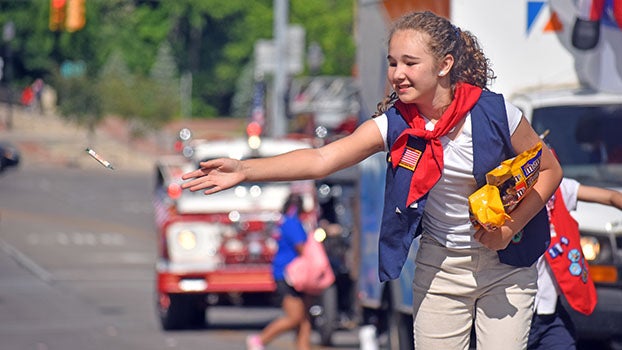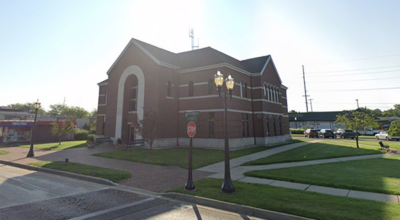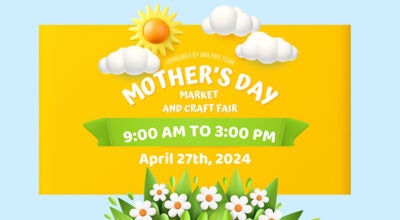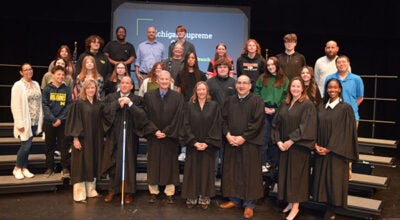Board of Commissioners chairman shares Australia stories with Rotary Club
Published 9:26 am Friday, October 2, 2009
By JOHN EBY
Dowagiac Daily News
Bob Wagel even attended a breakfast Rotary Club in Australia last spring.
The club was in Alice Springs, a telegraph station in the desert between Darwin and Melbourne, where they landed after a 15 1/2-hour Qantas flight from Los Angeles and toured the famous prison.
It was mid-April to May in Michigan -time for a fall color tour Down Under.
There were some wildfires still burning. They journeyed through some scorched areas.
Wagel also recalled lunch at a “saloon” on the “rough, Wild West frontier” for his fellow Rotarians Thursday noon at Elks Lodge 889.
“A guy rode his motorcycle into the restaurant,” Wagel said. “They also told us not to go out at night.”
That must be why they call Australia “Oz” – because you know you’re not in Kansas anymore.
Wagel, chairman of the Cass County Board of Commissioners, didn’t care for kangaroo, but in the spirit of “when in Rome, do as the Romans do,” he sampled ants, which he said taste like lemon peel.
He and his wife Jane “tailgated” with flutes of champagne at sundown at Ayers Rock. The sandstone formation is red because of iron ore oxidizing.
“Aborigines consider that a religious area,” he explained. “They ask you not to climb the rock, but a lot of people do.”
Sacred areas are also segregated by gender into male and female.
“Nobody really knows what goes on at these ceremonies,” Wagel said. “Men and women have ‘men’s business’ and ‘women’s business’ and it’s all separate.”
They were cruising down a highway at 60 to 70 mph when the coach came to a screeching halt. The bus driver leaped out, ran over and retrieved a horned lizard to show his passengers.
The Flying Doctor Service traverses the continent delivering doctors and nurses. “This was the forerunner of Qantas Airlines,” Wagel said.
Qantas was originally an acronym for Queensland and Northern Territories Aerial Services.
Narrating a slide with a montage of kangaroos, Wagel said, “The red ones are male and the gray ones are female.”
Australia has a population of some 21 million people who inhabit the sixth-largest country in the world and occupy an entire continent.
The largest mineral export is coal. Sugar is the largest agricultural export.
“We went through several sugar fields on the eastern coast,” he said. “We only traveled in the southeast, eastern and northeastern part. We didn’t get over to the west.”
Everyone oohed at the cute koala bear the couple petted, but Bob pointed out its sharp claws, coaching anyone showing it affection to stroke their backs from behind or “they’ll go after you and scratch you.”
That’s nothing compared to being crushed by a camel, eaten by a 1,500-pound crocodile or even shooing flies at Ayers Rock, which are so pesky everyone wears personal nets similar to Wagel’s beekeeper head gear.
“Bob and Jane have ridden camels on two continents now,” he said. “Camels are not native to Australia. They compete with beef and sheep” grazing.
“When a rancher sees them they will shoot them on sight. These camels run wild and will kill you. They’ll bite you. If that doesn’t do it, they’ll stomp on you. If that doesn’t kill you, they’ll fall on you – 2,000 pounds crushing you to death.”
“Crocodiles never stop growing,” he said. “They have killed them as big as 1,500 pounds or better. We saw them while crossing a river on a ferry boat. The ferry boat captain’s son had been killed about 30 days earlier. The kid was walking along a riverbank and the croc jumped out and got him.”
Doglike dingoes are used by Aborigines for hunting.
On a trail in the rain forest the guide halted them before they smacked into a web a yard wide and three feet tall spreading out from a spider “as big as your lunch plate. I do know the larger the spider, the better it is for you. The small ones are deadly.”
Wagel couldn’t resist photographing a vehicle parked in the desert with a boat lashed to its roof.
A frequently photographed roadside traffic sign shows a bird alive and dead after it has been run over.
The Wagels tackled the Great Barrier Reef on two fronts, snorkeling and from a glass-bottomed tour boat. “This island is where Steve Irwin died.” TV’s Crocodile Hunter perished Sept. 4, 2006, after being pierced in the chest by a stingray barb.
The Blue Mountains in coal country are as green as Ireland. “It’s much like our Smoky Mountains and the Grand Canyon. A beautiful area,” he said.
Coal sculptures made by natives could be Dogwood Fine Arts Festival public art if Dance of Creation and Resting Dancer were nude. Those lithe figures stood around a large sundial used as a clock.
The Melbourne prison operated from 1841 until the early 1900s, during which time 139 inmates were hung. “It’s only a tourist attraction now,” Wagel said, telling about one of the most famous individuals incarcerated there.
Ned Kelly, shrouded by a bushy dark beard, “was a bushranger, or an outlaw. He killed police three officers. They eventually hung him. Ned told the judge, ‘I’ll see you soon.’ The judge died two weeks later. His last words were, ‘I suppose it had to come to this,’ and ‘such is life.’ His mother was just down the hall in the female prison.” Wagel showed images of Kelly’s homemade plate metal armor.
“He forgot to arm his arms and legs,” he said. “When he was captured he was wounded 27 times. They took him to a doctor and patched him up, then they took him to court and sentenced him to die.”
The defiant Kelly, executed Nov. 11, 1880, became a folk hero. Mick Jagger appeared in one movie about him. In 2003, “Ned Kelly” starred the late Heath Ledger, Orlando Bloom and Geoffrey Rush.
Wagels visited a memorial to a battle in Turkey honoring people from Australia and New Zealand.
“Many Australians were surprised Americans would come to their service. There was a parade that lasted 2 1/2 hours. Businesses closed down. Americans could join in. There were two or three walking with an American flag. There were probably about 15 bagpipers and drums.”
Bob retired as a Union High School guidance counselor and Jane taught elementary school at Kincheloe, so the couple naturally toured a school – Yipirinya for Aborigines.
Wagel equated their status with Native Americans in America for their reverence to spirits, such as a deceased person removed from a mural, leaving a blank outline. They live on reservations which forbid alcohol.
“We read to the students and they read to us,” Bob said. “Education is really emphasized to try to get these folks into the social structure of Australia. The Australian government gives the Aborigines something like $240 a week. There maybe isn’t much incentive for some of those folks to work.”
Jane read with a girl who had three books to share. When they ran out of books, Mrs. Wagel dispatched the girl to the bookshelves for an additional volume. She returned with a grin and ‘Walter the Farting Dog,’ which Jane dutifully read.
Each tribe occupies its own area, where members live off the land.
“If they cross into other areas, it can be under pain of death,” he said. “Eating from the land, food is at a premium.”
Jane, who declined to sample ants, added, “They don’t raise anything. They just eat what’s there,” such as fishing streams. “They can’t go out of their territory because that’s another tribe’s food they would be taking. I prefer my garden.”
Wagel showed a slide of a critter the size of an opossum or a raccoon – a Tasmanian devil. “They’re having problems from a cancer that gets around the mouth so they cannot eat.”
Perhaps the most recognizable vista is the Sydney opera house on the harbor which can accommodate five performances simultaneously.
Wagels listened to an orchestra rehearse for an hour, but evening performances were sold out.
Wagel said the trip involved more hiking than expected. During one climb to see a waterfall led by two Aborigine women, she reached for a limb and brought down a handful of leaves, popping off ants for her guests to try.
Wagel said of Australia’s Medicare program, “After taxes, they pay 1.5 percent of income to cover medical expenses. They have an interesting college program. When they start making a salary, they pay a percentage back into a fund to support other students going to college.”
Wagel acquired a painting as “original Aborigine art.” It not only has an orange-and-black Chieftain motif, “Searching for Food” depicts ants and grubs. From a distance it appears three-dimensional. Upon closer inspection it is composed from thousands of color dots like one might make by repeatedly dipping a pencil eraser in paint and pressing it onto a canvas.
To close, Wagel taught Rotarians the game he learned in Alice Springs – “two-up.” It’s essentially calling heads and tails with two coins by raising both arms in the air, placing both arms behind your back or putting one in each place like an indoor swimmer. Father Rick Swanson collected the key chain prize.
Wagel also set out a table full of photos, Australian coins and currency picturing the queen and boomerangs, which come angled for either right-handers or lefties.
“Do you know what you call a boomerang that won’t come back?” quipped Treasurer Mike Franks.
“A stick.”
Eve Phillipson said Australians used to call Americans “yanks,” but they like rhyming, so it evolved into “tanks,” then “septic tanks,” and now just “septics.”
Though he tried ants, Wagel didn’t order a burger “with everything on it,” which includes egg.
Tiny cups of coffee cost $3, plus another $3 for a refill. A side order of bread costs $7 for a few slices. A quart jar of mayonnaise went for $11. Waitresses earn $18 to $22 an hour because there is no tipping.
Wagel topped Franks with a joke of his own.
“On the airline going over, I looked over and this guy in the next aisle over had his wedding band on the wrong hand.”
“I married the wrong woman,” came the reply.






